-
EXPERIENCE REPORT01-01-2018
Death education: sensibility for caregiving
Revista Brasileira de Enfermagem. 2018;71:1779-1784
Abstract
EXPERIENCE REPORTDeath education: sensibility for caregiving
Revista Brasileira de Enfermagem. 2018;71:1779-1784
DOI 10.1590/0034-7167-2017-0018
Views0See moreABSTRACT
Objective:
to report the application of a participatory teaching-learning method on the themes death, dying, and associate care to highlight its applicability to the students.
Method:
report of application of participatory method in 22 students from the 6th period of the undergraduate program in Nursing and Obstetrics of a public university. The first stage focused on personal experiences of the students and the second on professional prospects. As resources for data collection we used music, drawing, drama, and photography.
Results:
after applying the method, the students assigned meanings to death and nursing care, reflected, criticized, and resignified experiences on the theme.
Conclusion:
the method was considered applicable and effective to achieve the objective, that is, it enables learners to act as protagonists of the teaching-learning process, building together a new perspective of end-of-life care.
-
EXPERIENCE REPORT01-01-2018
Community intervention in the Nursing education: experience report
Revista Brasileira de Enfermagem. 2018;71:1774-1778
Abstract
EXPERIENCE REPORTCommunity intervention in the Nursing education: experience report
Revista Brasileira de Enfermagem. 2018;71:1774-1778
DOI 10.1590/0034-7167-2017-0351
Views0See moreABSTRACT
Objective:
To report the implementation and results of community intervention projects used as a strategy for teaching and developing people and communities in the training of community health nursing specialists at the Centro de Formação de Saúde Multiperfil (Multi-profile Health Training Center), Angola.
Method:
Report of experience of the use of community intervention projects in nursing.
Results:
Community intervention projects have contributed to the learning of students and to the promotion of health, citizenship and the empowerment of individuals and communities. Its implementation is in the fourth year, and 16 projects have already been developed in 2 distinct neighborhoods, and this year the intervention will cover a third.
Conclusions:
Nursing teaching should adopt strategies that lead the student not only in the path of professional autonomy, but, above all, in the empowerment of people and communities. Community intervention is undoubtedly important in this area.
-
EXPERIENCE REPORT01-01-2018
The Pororoca effect on permanent education in health: about the interaction research-work
Revista Brasileira de Enfermagem. 2018;71:1768-1773
Abstract
EXPERIENCE REPORTThe Pororoca effect on permanent education in health: about the interaction research-work
Revista Brasileira de Enfermagem. 2018;71:1768-1773
DOI 10.1590/0034-7167-2017-0462
Views0See moreABSTRACT
Objective:
to build municipal responsibility with the permanent education in health policy from the interaction between research and innovation of work practices.
Method:
experience reports structured through dialogic meetings that allowed the participative diagnosis and strategic administration considering research in health education.
Results:
from the activities and interactions, we identified active forces in the reinvention of training for workers in the municipal network of health services, in which we found three streams: “inside and outside interactions”, “movement towards meetings” and “strategic collective arrangements”.
Final considerations:
through action research and a collaborative critique, collective movements were constructed, they showed ways to produce new directions in health education and allowed the strategic creation of the Núcleo de Educação Permanente as a responsibility of the municipal government, not depending on Federal policies.
-
REVIEW01-01-2018
Educational technologies and practices for prevention of vertical HIV transmission
Revista Brasileira de Enfermagem. 2018;71:1759-1767
Abstract
REVIEWEducational technologies and practices for prevention of vertical HIV transmission
Revista Brasileira de Enfermagem. 2018;71:1759-1767
DOI 10.1590/0034-7167-2016-0333
Views0See moreABSTRACT
Objective:
to assess available evidence on educational technologies and practices for prevention of vertical HIV transmission.
Method:
LILACS, PubMed, Scopus, BDENF, between April and May 2016, with the descriptors: “Vertical Transmission of Infectious Disease”, “HIV”, “Health Education” and “Technology”.
Results:
there are 16 articles published between 2000 and 2014, mostly Brazilian and African, Cross-sectional and with low level of evidence. The studies covered the use of hard technologies, through video, radio and telephone, and soft, emphasizing, in particular, counseling.
Conclusion:
the studies recognize the importance of educational activities as a tool for health promotion in the context of vertical HIV transmission, despite reporting the need for constant training of professionals and urgency in the renewal of educational concepts and practices. Therefore, it is recommended to expand and consolidate health counseling and emphasize the role of nurses as an important actor in this setting.
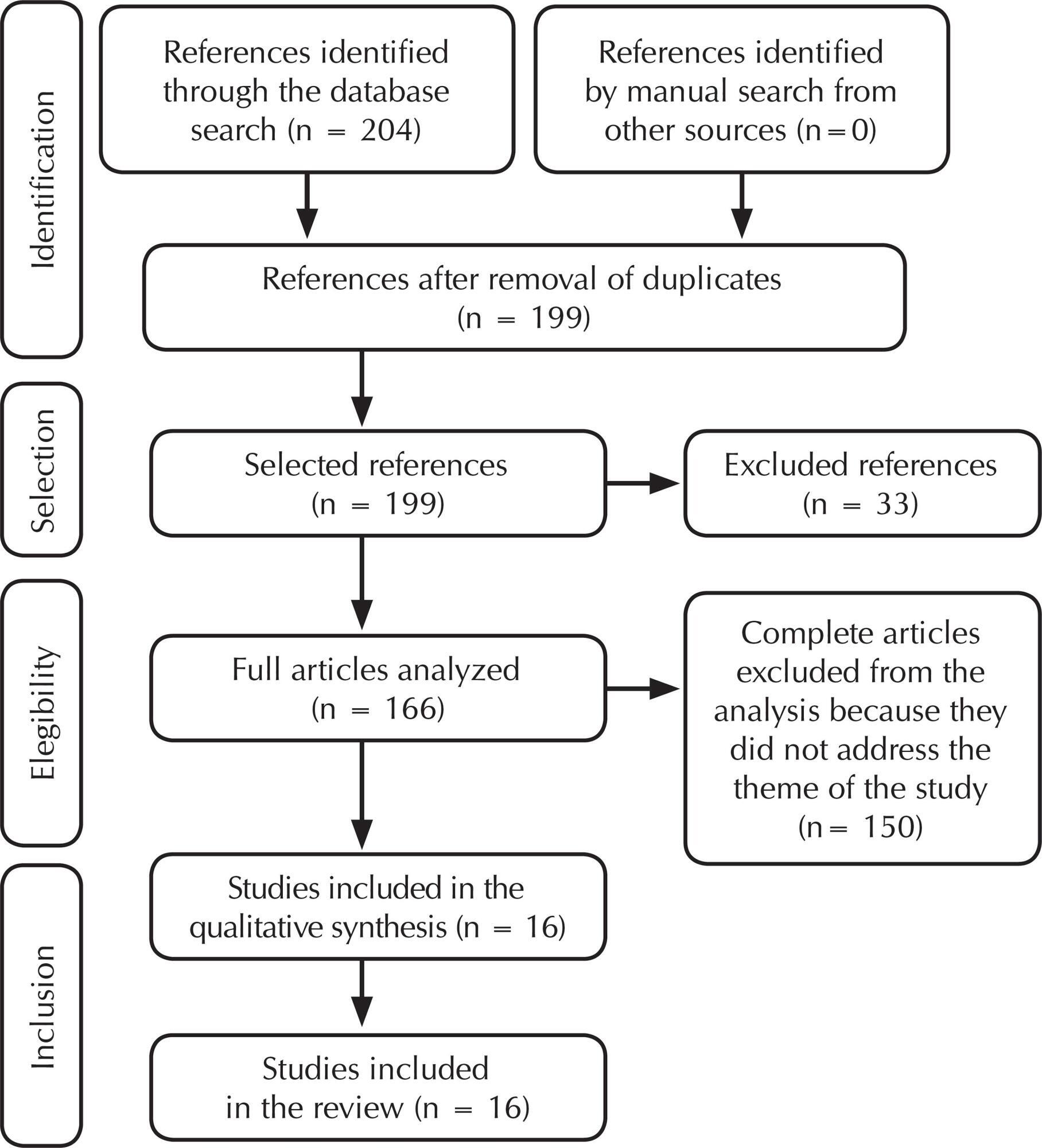
-
REVIEW01-01-2018
Liberating critical pedagogy of Paulo Freire in the scientific production of Nursing 1990-2017
Revista Brasileira de Enfermagem. 2018;71:1751-1758
Abstract
REVIEWLiberating critical pedagogy of Paulo Freire in the scientific production of Nursing 1990-2017
Revista Brasileira de Enfermagem. 2018;71:1751-1758
DOI 10.1590/0034-7167-2017-0699
Views0See moreABSTRACT
Objective:
To analyze the theoretical and methodological application of Paulo Freire’s critical pedagogy in the scientific production of nursing.
Method:
An integrative review was carried out with consultation of the databases: LILACS, BDENF, MEDLINE, PUDMED and CINHAL. We included studies in the Spanish, English and Portuguese languages, published from 1990 to 2017.
Results:
A total of 38 articles were analyzed, of which the main concepts adopted were: dialogue/dialogicity, awareness/critical awareness and questioning. Regarding the application of the method, it was noticed the predominance of the adoption of elements such as culture circles, thematic phase and horizontality relation of the nurse with the individuals involved.
Conclusion:
Nursing has partially appropriated the Freire’s referential. However, it reveals the intentionality of a transformative practice that requires deepening for the implementation of the method in its full.

-
REVIEW01-01-2018
Supervised internship in undergraduate education in nursing: integrative review
Revista Brasileira de Enfermagem. 2018;71:1740-1750
Abstract
REVIEWSupervised internship in undergraduate education in nursing: integrative review
Revista Brasileira de Enfermagem. 2018;71:1740-1750
DOI 10.1590/0034-7167-2017-0340
Views0See moreABSTRACT
Objective:
to analyze the evidence available in the literature on the contributions of the Supervised Internship in nursing training in Brazil and the teaching-learning methods employed.
Method:
integrative review of the literature, with search of articles published between 2002 and 2016, in PubMed, LILACS, SciELO and Eric databases.
Results:
Of the 4,699 articles consulted, 14 met the inclusion criteria. The analysis of these studies revealed three thematic categories: the understanding about the role of Supervised Internship; the teaching-learning processes employed; and their contributions to the training of nurses.
Final considerations:
this is a fundamental element in the academic training, since, depending on the didactic-pedagogical organization, it makes possible the (re) signification of the acquired knowledge throughout the course and realizes the professional competences. The teaching-learning methods are structured by the critical pedagogy, being the active methodologies the main choices of the authors.
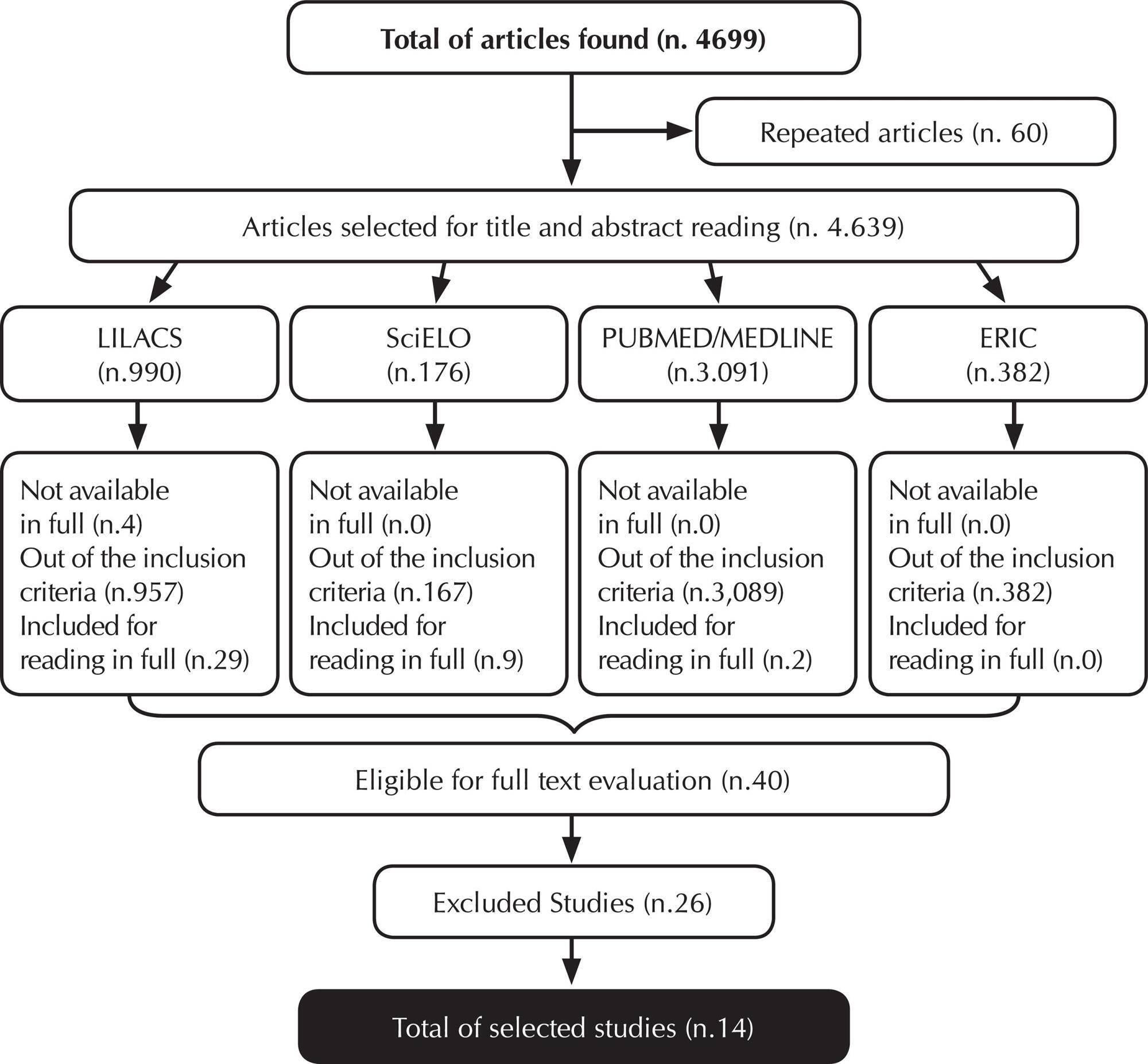
-
REVIEW01-01-2018
Nursing higher education in MERCOSUR: a bibliometric study
Revista Brasileira de Enfermagem. 2018;71:1732-1739
Abstract
REVIEWNursing higher education in MERCOSUR: a bibliometric study
Revista Brasileira de Enfermagem. 2018;71:1732-1739
DOI 10.1590/0034-7167-2017-0405
Views0See moreABSTRACT
Objective:
to identify productions that approach nursing high education in member states of MERCOSUR.
Method:
bibliometric study with quantitative approach carried out in search mechanisms, such as BVS, Capes, SciELO, Scopus and PubMed, between 2006 and 2015. It was found 301 articles about nursing education in MERCOSUR.
Results:
point to concern for the nurse’s education for public health policies, for teacher’s education and the teaching-learning process. However, publications regarding technologies associated with distance education on health field are low.
Conclusion:
this study contributes with discussion in nursing education field when points to the themes regarding the production about nurses’ education in MERCOSUR, specially, the range of targets set up in the Educational MERCOSUR agreement.
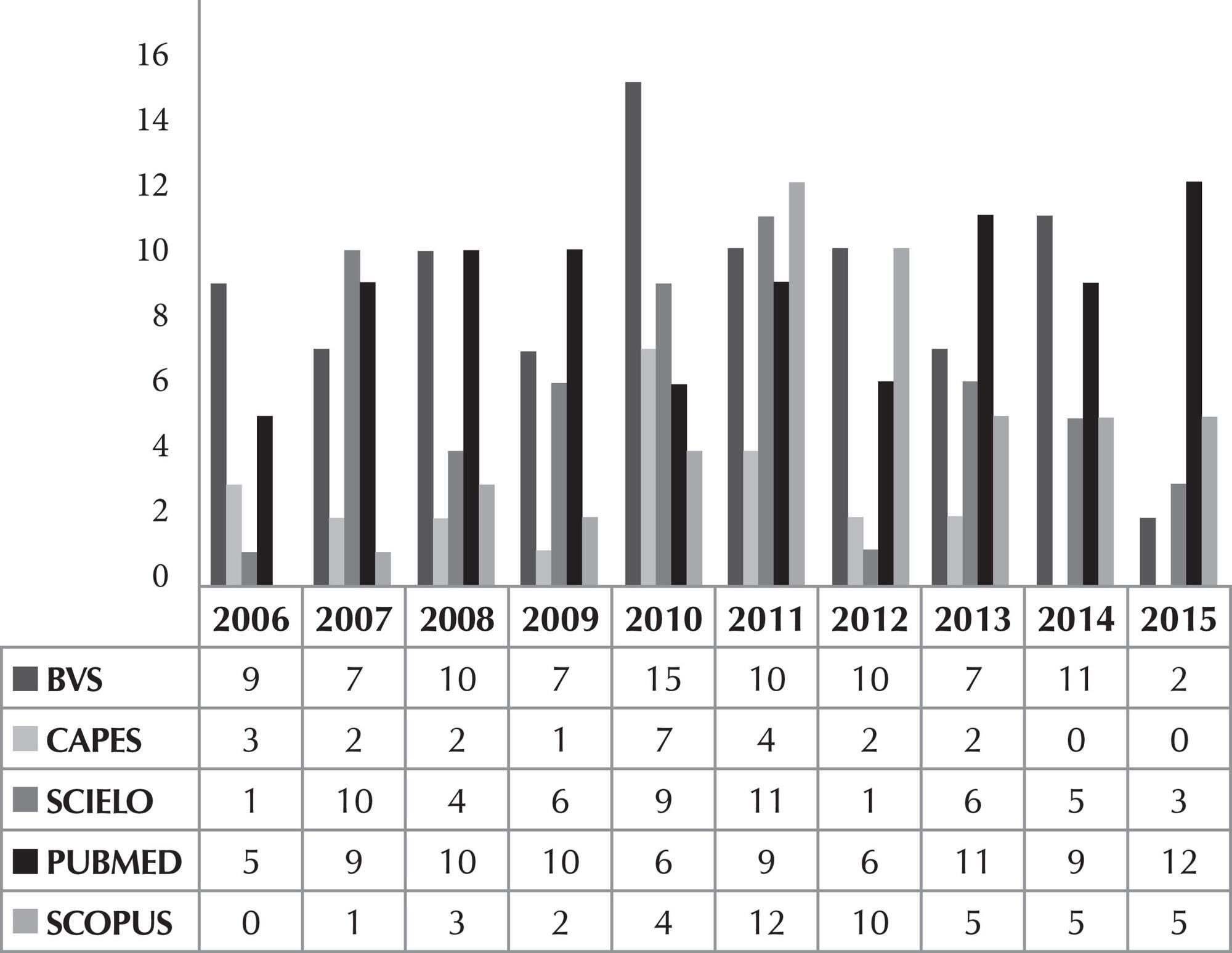
-
REVIEW01-01-2018
Educational technologies for health education on stroke: an integrative review
Revista Brasileira de Enfermagem. 2018;71:1724-1731
Abstract
REVIEWEducational technologies for health education on stroke: an integrative review
Revista Brasileira de Enfermagem. 2018;71:1724-1731
DOI 10.1590/0034-7167-2017-0041
Views0See moreABSTRACT
Objective:
to identify in the scientific literature the educational technologies used in the health education process related to stroke.
Method:
integrative review, whose eligibility criteria of the articles were: match the keywords “health education” and “stroke”; be a research paper; be in Portuguese, English and Spanish; be available electronically in the databases LILACS, PubMed/Medline, Scopus and CINAHL; year of publication between 2000 and 2016.
Results:
24 publications were found. The analysis was carried out by means of analytical and interpretive readings. There were many educational technologies used in the health education process for stroke.
Final considerations:
the printed material for general public stood out, aiming to the recognition of alert signs of the disease and the emergency decision-making before suspicious cases of the disease.
-
EXPERIENCE REPORT01-01-2017
Focus group on qualitative research: experience report
Revista Brasileira de Enfermagem. 2017;70(2):424-429
Abstract
EXPERIENCE REPORTFocus group on qualitative research: experience report
Revista Brasileira de Enfermagem. 2017;70(2):424-429
DOI 10.1590/0034-7167-2016-0091
Views1See moreABSTRACT
Objective:
to report the experience of applying the focus group technique for production of data in qualitative research.
Method:
four group sessions were held from May to June 2015, with the participation of professionals from the public sector of PHC and from specialized service.
Results:
the way focus group was developed is described in steps: planning, recruitment, ambience, group sessions, and evaluation.
Conclusion:
we highlight that the focus group, as a technique to produce data in collective space, can contribute not only to the construction of knowledge in Nursing, but also to the research approach with the assistance practice.

-
RESEARCH01-01-2017
Guide of attributes of the nurse’s political competence: a methodological study
Revista Brasileira de Enfermagem. 2017;70(3):526-534
Abstract
RESEARCHGuide of attributes of the nurse’s political competence: a methodological study
Revista Brasileira de Enfermagem. 2017;70(3):526-534
DOI 10.1590/0034-7167-2016-0483
Views0See moreABSTRACT
Objective:
To build and validate a guide of attributes of the nurse’s political competence.
Method:
Methodological research. This study comprised the construction of the instrument through literature review; experts validation of pre-established attributes for composing the guide; and clinical validation in the nurses work environment/reality. The data collection took place in the months from August to October 2014, and the analysis was based on the content analysis of Bardin and use of Epi info 3.5. All ethical precepts have been complied with.
Results:
From 29 attributes found in the literature, 25 have been validated by experts. Clinical/practical validation involved the participation of 43 nurses, who observed that the attributes are not articulated with the professional practices developed by them.
Conclusion:
The attributes of the nurse’s political competence were identified with support of literature. It is concluded that the professionals still have limited and fragmented perception of political competence, expressing difficulty/limitation.
-
ORIGINAL ARTICLE10-09-2023
Independent and combined effects of lifestyle behaviors on adolescent health-related quality of life
Revista Brasileira de Enfermagem. 2023;76(4):e20220780
Abstract
ORIGINAL ARTICLEIndependent and combined effects of lifestyle behaviors on adolescent health-related quality of life
Revista Brasileira de Enfermagem. 2023;76(4):e20220780
DOI 10.1590/0034-7167-2022-0780
Views0See moreABSTRACT
Objective:
To investigate the independent and combined effects of lifestyle behaviors, including physical activity, sedentary behavior, sleep duration and food intake, in the health-related quality of life (HRQoL) of Brazilian adolescents.
Methods:
Cross-sectional school-based study, with the participation of 306 adolescents aged 14 to 18 years. A questionnaire was applied with structured questions to collect lifestyle behaviors data. Perception of the HRQoL was identified using the Kidscreen-27. The study used covariance analysis and linear regression models for statistical analysis.
Results:
Adolescents who reported ≤ 2 hours/day of screen-based sedentary behavior and sleep duration equivalent to 8-10 hours/night presented significantly higher HRQoL. Adolescents who reported joint adherence ≥ 3 healthy lifestyle behaviors demonstrated approximately two [OR=2.12] to three times [OR=3.04] more chance of presenting higher perceptions of HRQoL.
Conclusion:
Although healthy lifestyle behaviors had a positive independent effect on HRQoL, joint adherence to healthy behaviors enhances the cumulative effect.

-
12-04-2023
Sleep quality of nurses who worked in coping with COVID-19: an integrative review
Revista Brasileira de Enfermagem. 2023;76(6):e20230007
Abstract
Sleep quality of nurses who worked in coping with COVID-19: an integrative review
Revista Brasileira de Enfermagem. 2023;76(6):e20230007
DOI 10.1590/0034-7167-2023-0007
Views0See moreABSTRACT
Objective:
to analyze sleep quality of nurses who worked coping with COVID-19 in scientific evidence.
Methods:
an integrative review, carried out in seven databases, including studies between December 2021 and June 2022, without language restrictions. The sample consisted of 15 primary studies.
Results:
nurses working in hospital, intensive care, outpatient care and teaching institutions constitute a vulnerable group for sleep disorders: latency, duration, efficiency and quality. The disorders identified involved insomnia at varying levels of severity: daytime dysfunction and morning sleepiness. Night work and low capacity for self-care were determinants of impaired sleep patterns.
Final considerations:
the COVID-19 pandemic contributed to greater vulnerability of nurses to changes in sleep, requiring strategies for risk management and well-being promotion.

-
ORIGINAL ARTICLE12-08-2023
Care for older adults with disabilities in Long Term Care Facility
Revista Brasileira de Enfermagem. 2023;76:e20220767
Abstract
ORIGINAL ARTICLECare for older adults with disabilities in Long Term Care Facility
Revista Brasileira de Enfermagem. 2023;76:e20220767
DOI 10.1590/0034-7167-2022-0767
Views0See moreABSTRACT
Objective:
to analyze the constitution of care offered to older adults with disabilities, from Long Term Care Facility professionals’ perspective.
Methods:
this is a discourse analysis based on the post-structuralist framework. Participants in this study are professionals involved in the care for older adults, totaling 14 respondents, 13 women and one man.
Results:
from professionals’ perspective, there is a fine line between caring for older adults with disabilities and maintaining their autonomy. Care in which autonomy is restricted predisposes older adults to a process of dependency.
Final considerations:
caring for older adults with disabilities constitutes the challenge between caring and maintaining independence. Thus, older adult-centered care should be taken as a premise so that their individualities are respected.
-
ORIGINAL ARTICLE12-08-2023
Polypharmacy, potentially inappropriate medications and associated factors among older adults with hypertension in primary care
Revista Brasileira de Enfermagem. 2023;76:e20220785
Abstract
ORIGINAL ARTICLEPolypharmacy, potentially inappropriate medications and associated factors among older adults with hypertension in primary care
Revista Brasileira de Enfermagem. 2023;76:e20220785
DOI 10.1590/0034-7167-2022-0785
Views0See moreABSTRACT
Objective:
to identify the prevalence and associations of polypharmacy and potentially inappropriate medication use among older adults with hypertension treated in primary care.
Methods:
a cross-sectional study carried out with older adults with hypertension treated at a Family Health Strategy unit. Data collection included analysis of medical records, interviews and multidimensional assessment of older adults. Socio-demographic information and clinical variables were collected. Statistical analysis was performed by multiple logistic regression.
Results:
polypharmacy prevalence was 38.09%, and potentially inappropriate medication (PIM), 28.57%. There was a significant association between polypharmacy and PIM use, altered sleep and ethnicity. PIM use was associated with polypharmacy, worse family functioning, and absence of a caregiver. Cognitive decline reduces the prevalence of these medications.
Conclusions:
polypharmacy and PIM use among older adults with hypertension represent a problem in this population, especially among the most vulnerable.
-
REVIEW12-08-2023
Educational technologies used to promote self-care for people with diabetes mellitus: integrative review
Revista Brasileira de Enfermagem. 2023;76:e20230049
Abstract
REVIEWEducational technologies used to promote self-care for people with diabetes mellitus: integrative review
Revista Brasileira de Enfermagem. 2023;76:e20230049
DOI 10.1590/0034-7167-2023-0049
Views0See moreABSTRACT
Objective:
To summarize the scientific productions that used educational technologies to promote self-care for people with diabetes.
Method:
Integrative review carried out from October 2022 to January 2023, in the databases: LILACS; Scopus; Embase; PubMed/MEDLINE and CINAHL. The search was paired, and the sample consisted of ten articles. The levels of evidence were analyzed by the Hierarchy of Evidence for Intervention Studies, and the results were synthesized for interpretation of the findings.
Results:
The educational technologies identified to promote self-care were: mobile applications, interactive platforms, print, telemonitoring, video and simulation. The focus of the contents was on the promotion of foot care, prevention of neuropathy, self-management, knowledge, and expectation of people with diabetes and prevention of acute complications.
Conclusion:
The synthesis of knowledge about educational technologies to promote self-care for people with diabetes pointed to the need for robust evidence.

-
ORIGINAL ARTICLE05-03-2024
What is the burden of multimorbidity and the factors associated with its occurrence in elderly Brazilians?
Revista Brasileira de Enfermagem. 2024;77(1):e20220809
Abstract
ORIGINAL ARTICLEWhat is the burden of multimorbidity and the factors associated with its occurrence in elderly Brazilians?
Revista Brasileira de Enfermagem. 2024;77(1):e20220809
DOI 10.1590/0034-7167-2022-0809
Views0See moreABSTRACT
Objective:
To estimate the prevalence of multimorbidity in elderly people and its association with sociodemographic characteristics, lifestyle, and anthropometry.
Methods:
This was a cross-sectional study using data from the National Health Survey, 2019. A total of 22,728 elderly individuals from all 27 Brazilian states were randomly selected. Poisson regression models with robust variance were employed, and a significance level of 5% was adopted.
Results:
The prevalence of multimorbidity was 51.6% (95% CI: 50.4-52.7), with the highest estimates observed in the South and Southeast. Multimorbidity was associated with being female (aPR = 1.33; 95% CI: 1.27-1.39), being 80 years old or older (aPR = 1.12; 95% CI: 1.05-1.19), having low education (aPR = 1.16; 95% CI: 1.07-1.25), past cigarette use (aPR = 1.16; 95% CI: 1.11-1.21), insufficient physical activity (aPR = 1.13; 95% CI: 1.06-1.21), and screen use for 3 hours or more per day (aPR = 1.13; 95% CI: 1.08-1.18).
Conclusion:
Multimorbidity affects more than half of the elderly population in Brazil and is associated with social, demographic, and behavioral factors.

-
ORIGINAL ARTICLE09-16-2019
Validation of educational booklet: an educational technology in dengue prevention
Revista Brasileira de Enfermagem. 2019;72(5):1318-1325
Abstract
ORIGINAL ARTICLEValidation of educational booklet: an educational technology in dengue prevention
Revista Brasileira de Enfermagem. 2019;72(5):1318-1325
DOI 10.1590/0034-7167-2018-0771
Views0See moreABSTRACT
Objective:
to validate a booklet on dengue prevention in order to make it an educational technology to be used with the population.
Method:
methodological study, carried out with two groups of judges specialized in health and other areas. For data analysis, the calculation of Content Validity Index was carried out.
Results:
the booklet, in general, was considered valid by the expert judges, since it obtained an overall CVI of 70%. However, it has undergone a textual and aesthetic re-elaboration. The changes were based on the substitution of expressions, phrases, information additions and language adequacy. The illustrations were redone, adding clarity, expressiveness, movement, interaction and contextualization.
Conclusion:
the booklet is valid to be used for the population, with the purpose of informing, in a playful way, the forms of prevention and combat to mosquito transmitting dengue.

-
REVIEW09-18-2020
Mental health of healthcare professionals in China during the new coronavirus pandemic: an integrative review
Revista Brasileira de Enfermagem. 2020;73:e20200338
Abstract
REVIEWMental health of healthcare professionals in China during the new coronavirus pandemic: an integrative review
Revista Brasileira de Enfermagem. 2020;73:e20200338
DOI 10.1590/0034-7167-2020-0338
Views0See moreABSTRACT
Objective:
to identify publishing related to the mental health of health professionals working in the front line of the COVID-19 pandemic.
Methods:
an integrative review that included primary articles indexed in the Latin American and Caribbean Literature in Health Sciences, Medical Literature Analysis and Retrieval System Online, Cumulative Index to Nursing and Allied Health Literature, Scopus, Embase, Web of Science, Science Direct databases and US National Library of Medicine databases. The result analysis was performed descriptively, in four analytical categories.
Results:
The publishing involved aspects related to insufficient personal protective equipment, feelings of fear and stigma, the need for psychological and psychiatric support and the possibility of post-outbreak mental disorders.
Conclusion:
All mentioned aspects have a direct impact on the mental health of professionals, demanding the creation of strategies that minimize the emotional burnout of workers, considering that each country and culture reacts differently to the disease.

-
ORIGINAL ARTICLE06-27-2019
Religious/spiritual coping and level of hope in patients with cancer in chemotherapy
Revista Brasileira de Enfermagem. 2019;72(3):640-645
Abstract
ORIGINAL ARTICLEReligious/spiritual coping and level of hope in patients with cancer in chemotherapy
Revista Brasileira de Enfermagem. 2019;72(3):640-645
DOI 10.1590/0034-7167-2018-0358
Views0See moreABSTRACT
Aim:
To demonstrate the relationship between religious/spiritual coping and hope in cancer patients undergoing chemotherapy.
Method:
This is a cross-sectional, descriptive study with a quantitative approach performed in a reference outpatient clinic in Caruaru, PE, between August and October 2017. A total of 82 cancer patients undergoing chemotherapy were included in the study, using the brief religious/spiritual coping scale (RCOPE-Brief) and the Herth Hope Scale (HHS).
Results:
The sample presented mean positive RCOPE scores (3.03 ± 0.41) and the level of hope was considered high (42.7 points ± 3.67). Patients who had a high RCOPE score were found to have a higher mean of Herth’s level of hope (44.12 points).
Conclusion:
This study becomes relevant to nursing professionals by encouraging care that takes into account the patient’s spiritual dimension in order to stimulate positive mechanisms of religious coping and, consequently, raise the levels of hope.
-
ORIGINAL ARTICLE04-22-2020
Construction and validation of an educational booklet on care for children with gastrostomy
Revista Brasileira de Enfermagem. 2020;73(3):e20190108
Abstract
ORIGINAL ARTICLEConstruction and validation of an educational booklet on care for children with gastrostomy
Revista Brasileira de Enfermagem. 2020;73(3):e20190108
DOI 10.1590/0034-7167-2019-0108
Views0See moreABSTRACT
Objectives:
to describe the process of construction and validation of an educational booklet on care for children with gastrostomy, directed to caregivers.
Methods:
a methodological study developed in five stages: bibliographic survey; situational diagnosis; illustration, layout, design and text construction; expert validation and Flesch-Kincaid Readability calculation; validation with the target audience. Content Validity Index and Suitability Assessment of Materials were applied for expert analysis.
Results:
the Content Validity Index obtained overall score of 0.93. In the Suitability Assessment of Materials score, the booklet scored 85.2%. It presented a satisfactory readability percentage, with an overall score of 72%, and was consistent with caregivers’ assessment in the validation with the target audience, considering the explanatory technology, important and adequate.
Conclusions:
the developed educational booklet was considered valid for use by caregivers, thus contributing to the maintenance of best practices in care for children with gastrostomy.
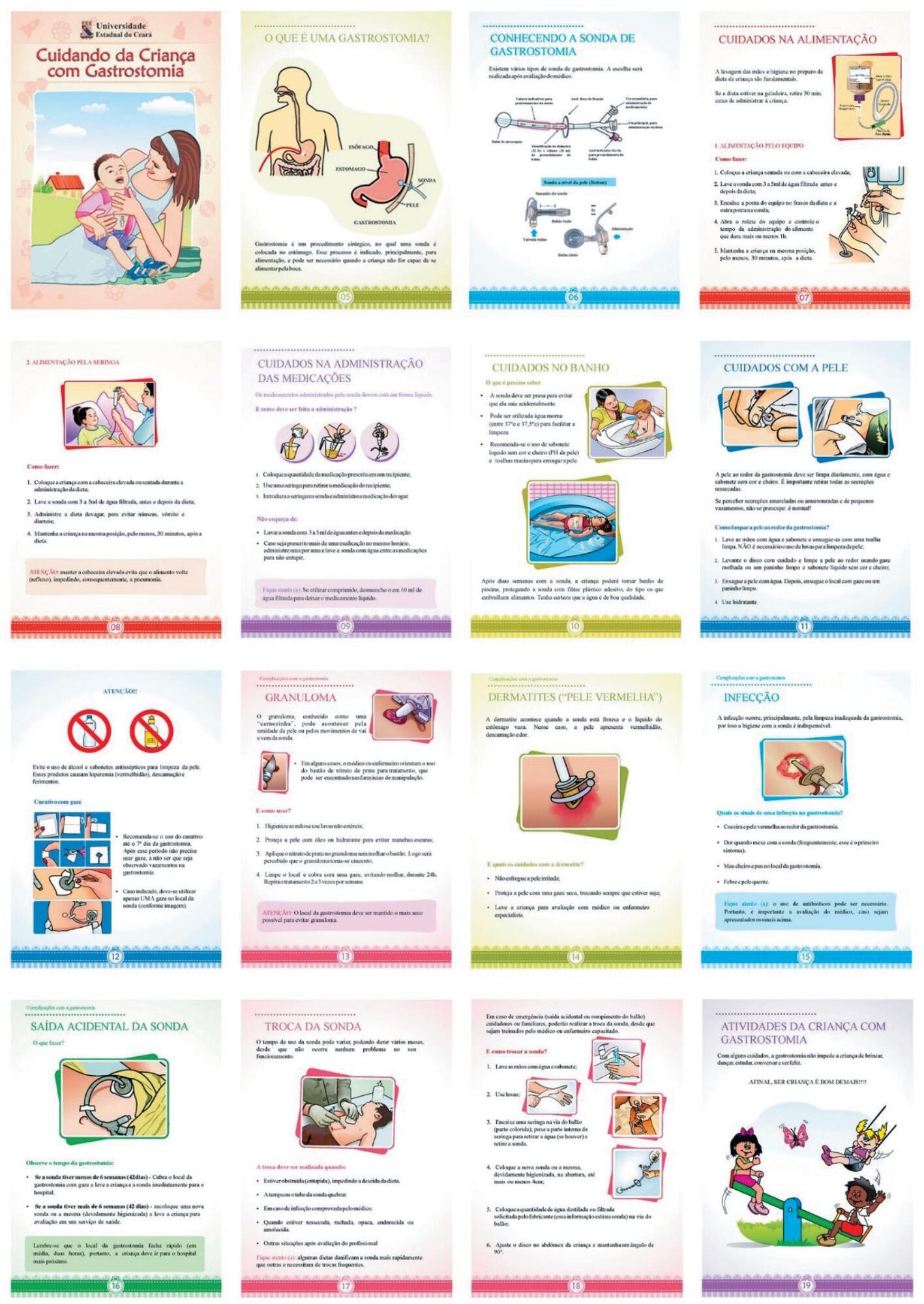
-
REVIEW12-05-2019
Hospital transition care for the elderly: an integrative review
Revista Brasileira de Enfermagem. 2019;72:294-301
Abstract
REVIEWHospital transition care for the elderly: an integrative review
Revista Brasileira de Enfermagem. 2019;72:294-301
DOI 10.1590/0034-7167-2018-0286
Views0See moreABSTRACT
Objective:
to identify evidence of scientific production on hospital transition care provided to the elderly.
Method:
an integrative review, with publications search in the MEDLINE, PubMed, LILACS, BDENF, Index Psychology and SciELO databases, with keywords and Mesh terms: elderly, hospitalization, patient discharge, health of the elderly, and transitional care, between 2013 and 2017 in English, Portuguese and Spanish. The 14 selected articles analysis was carried out through exploratory and critical reading of titles, abstracts and results of the researches.
Results:
transitional care can prevent re-hospitalizations as they enable rehabilitation, promotion and cure of illnesses in the elderly.
Final considerations:
transitional care implies the improvement of the quality of life of the elderly person, requiring skilled health professionals who involve the family through accessible communication.

-
ORIGINAL ARTICLE12-21-2020
Development of an appearance validity instrument for educational technology in health
Revista Brasileira de Enfermagem. 2020;73:e20190559
Abstract
ORIGINAL ARTICLEDevelopment of an appearance validity instrument for educational technology in health
Revista Brasileira de Enfermagem. 2020;73:e20190559
DOI 10.1590/0034-7167-2019-0559
Views1See moreABSTRACT
Objectives:
to develop and evaluate the convergence of the instrument for the appearance validity of educational technologies in health.
Methods:
methodological study conducted in two steps. In step 1, the instrument items were developed, with subsequent content validity by nine specialists in the development of educational technologies in health. In step 2, the convergent validity between another instrument and the appearance instrument was performed. Correlation results above r> 0.3 and p <0.05 were considered as plausible convergent validity.
Results:
the ten items of the initial version of the appearance instrument were submitted to content validity that resulted in a final version with 12 items (Content Validity Index = 0.93). The correlation indexes were strong with the objective and appearance domains; moderate with motivation, organization and total; and weak with writing style.
Conclusions:
the appearance instrument demonstrated content validity and convergent validity, in addition to a strong correlation with the other instrument.
-
ORIGINAL ARTICLE02-10-2020
Burnout among nursing students: predictors and association with empathy and self-efficacy
Revista Brasileira de Enfermagem. 2020;73(1):e20180280
Abstract
ORIGINAL ARTICLEBurnout among nursing students: predictors and association with empathy and self-efficacy
Revista Brasileira de Enfermagem. 2020;73(1):e20180280
DOI 10.1590/0034-7167-2018-0280
Views0See moreABSTRACT
Objective:
to analyze burnout, its predictors and association with empathy and self-efficacy among nursing students.
Method:
cross-sectional analytical study with 284 students from five state universities in the state of Parana, Brazil. The instruments applied were: social and academic questionnaire, Maslach Burnout Inventory, Interpersonal Reactivity Index and Occupational Self-Efficacy Scale (Short Form). Spearman’s correlation and univariate and multivariate logistic analysis were used.
Results:
6.0% of the students presented high burnout, 36.3% presented high emotional exhaustion, 37.7% presented high depersonalization and 28.2% presented low personal accomplishment. The burnout predictors were: absence of physical activity; weekly workload >24 hours; low empathic concern. There were negative correlations between empathy (empathic concern and perspective taking) and depersonalization; self-efficacy and emotional exhaustion; and positive correlations between personal accomplishment and empathy and self-efficacy.
Conclusion:
Personal factors and an academic variable were burnout predictors among nursing students. The correlations suggest that self-efficacy and empathy can prevent burnout.
-
REVIEW08-07-2020
Positive aspects of authentic leadership in nursing work: integrative review
Revista Brasileira de Enfermagem. 2020;73(6):e20190118
Abstract
REVIEWPositive aspects of authentic leadership in nursing work: integrative review
Revista Brasileira de Enfermagem. 2020;73(6):e20190118
DOI 10.1590/0034-7167-2019-0118
Views0See moreABSTRACT
Objective:
To identify and analyze the existing scientific production on the positive aspects of authentic leadership in the nurse’s work process.
Method:
This is an integrative literature review. The databases used were Scientific Electronic Library Online; Latin American and Caribbean Literature on Health Sciences; and National Library of Medicine – National Institutes of Health.
Results:
In this study, 17 articles were selected for analysis; 1 study (6%) was published in a national journal, and 16 (94%) were international studies. Of the 17 (100%) articles studied, 11 (65%) were developed in Canada. The hospital environment was present in the 17 (100%) articles.
Final considerations:
Authentic leadership has several positive aspects that significantly influence the nurse’s work process, such as engagement and job satisfaction, retention of new nurses, organizational commitment, among others.
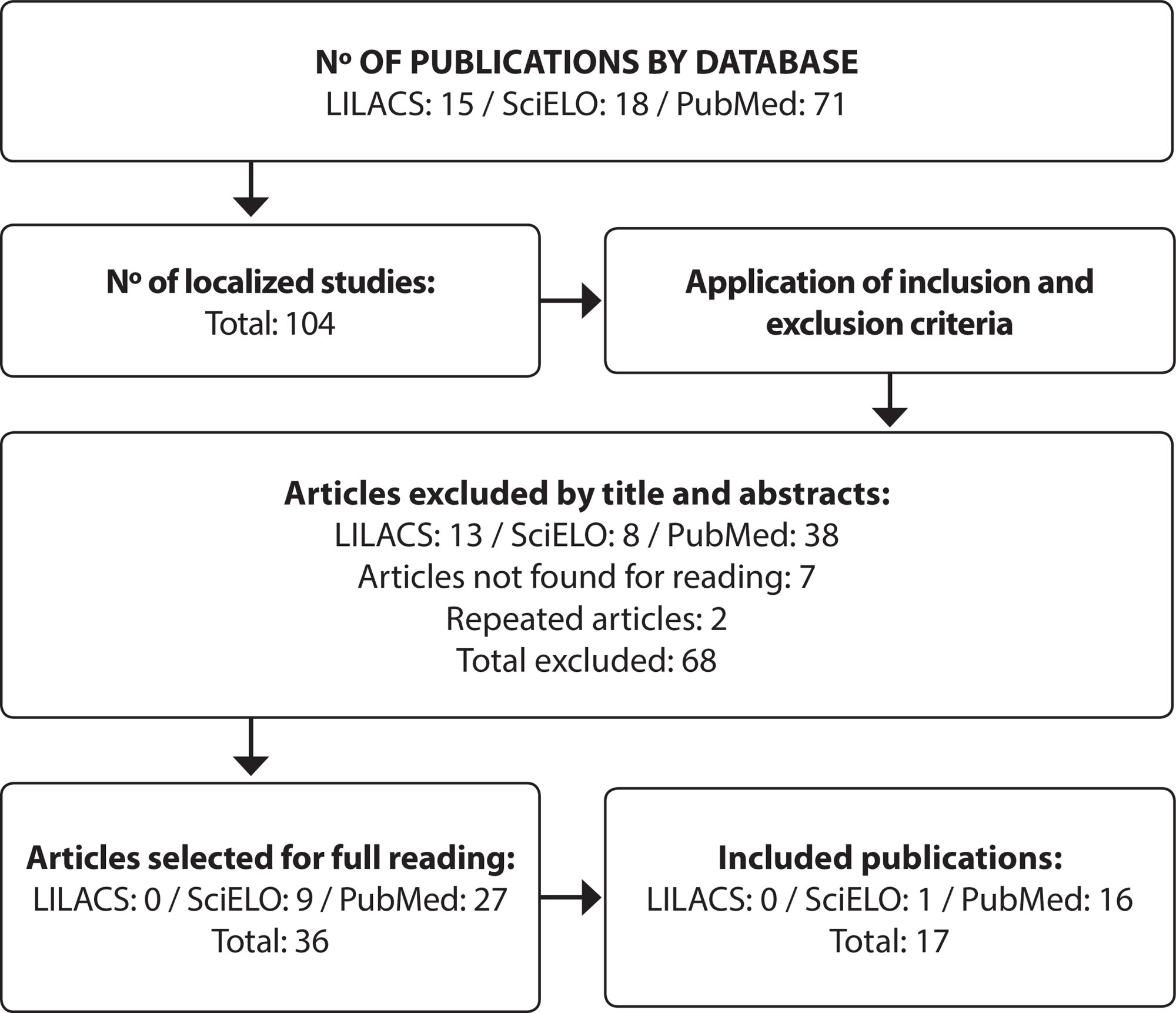
Search
Search in:
Nuvem de Tags
Adolescente (85) Atenção Primária à Saúde (239) COVID-19 (91) Criança (91) Cuidados de Enfermagem (269) Educação em Enfermagem (151) Educação em Saúde (139) Enfermagem (930) Enfermagem Pediátrica (86) Estudantes de Enfermagem (77) Estudos de Validação (131) Família (87) Idoso (208) Promoção da Saúde (99) Qualidade de Vida (104) Saúde do Trabalhador (86) Saúde Mental (145) Saúde Pública (82) Segurança do Paciente (150) Tecnologia Educacional (100)



